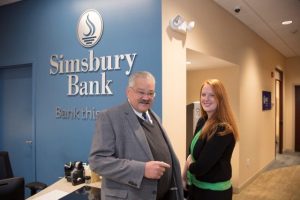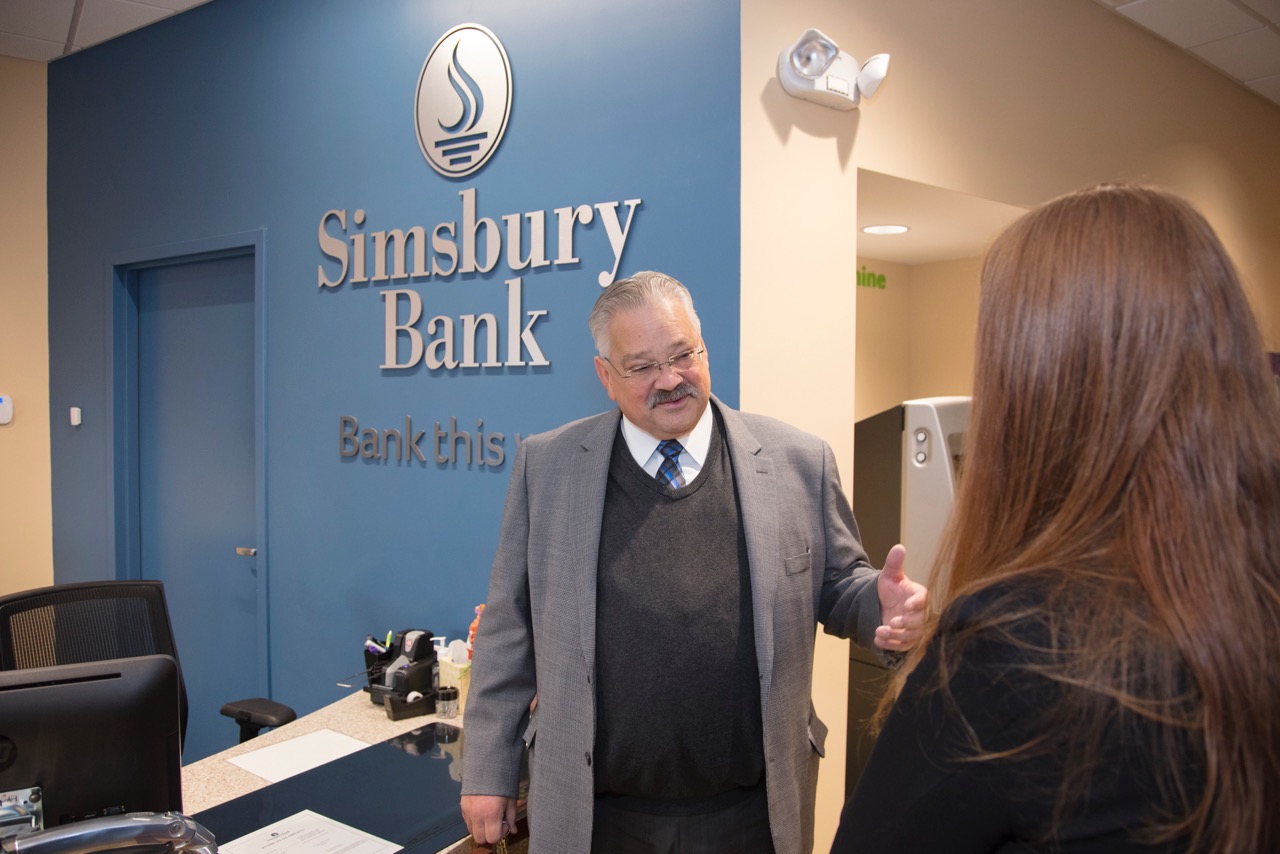Given historic Simsbury’s classic New England vibe, Simsbury Bank has got to be one of those “It’s a Wonderful Life” kind of banks, with a long, storied history and old-timey photos hung on every wall.
Actually, no. The bank is just 23 years old, and came about years after the industry collapse that resulted in the failure of dozens of banks, including giants such as Fleet and Shawmut. A group of local business owners – sitting around a folding table – decided that the Farmington Valley needed its own bank, and by 1995, the founding directors had raised enough money to receive the State Department of Banking’s first new bank charter in six years.

“The state was so busy closing banks that it wasn’t allowing new charters,” says Martin Geitz, president and chief executive officer.
When the bank opened its doors in 1995, it became clear that there was enormous consumer demand for a friendly, community-oriented bank where personal service and respect for customers was paramount. During the first several years of the bank’s operation, consumer deposit and loan demand outpaced commercial banking demand. Ten years later, 80 percent of its loans were residential mortgages, home equity loans and other consumer loans. Only 20 percent of the bank’s loans were to commercial businesses. The bank’s board and management decided at that time to put greater emphasis on commercial banking. Since then, the bank has added many new products and services tailored for businesses.
 Simsbury Bank has partnered with the University of Connecticut School of Business to expand its executive education program for family business owners, employees and the professionals who work with them to help improve general business skills. The goal is to educate and inform families in business and the resources that support them.
Simsbury Bank has partnered with the University of Connecticut School of Business to expand its executive education program for family business owners, employees and the professionals who work with them to help improve general business skills. The goal is to educate and inform families in business and the resources that support them.
A weekend program known as Base Camp provides an overview of family business best practices, attended by accountants, lawyers, bankers, and family business owners.
“They hear what each other’s needs are,” says Robin Bienemann of UConn’s Family Business Program. “It’s a 360-degree view of this ecosystem.”
In Connecticut, 60 percent of businesses are family-owned. “Family businesses look like Bigelow Tea and Munson’s Chocolates, and they look like family farms, like Miller Foods,” she says. “And Simsbury Bank has been a wonderful collaborator. The bank has a real passion for helping family businesses.”
“We woke up and realized we have a lot of family businesses as customers, so we said, ‘Why don’t we learn about family businesses?’ ” says Geitz. “We want to be the best bank to family-owned businesses.”
The bank’s participation in the UConn program had led to a much greater understanding of how family businesses are similar to, and different from, non-family businesses.
“We’ve learned that sometimes things get decided differently in a family business,” Geitz says. “They tend to have different objectives, roles within the family can vary, and they may have a different appetite for risk. We’re working our way towards becoming a more valuable partner for family businesses.”

Michael Girard, president of Simscroft-Echo Farms, was one of the original organizers of Simsbury Bank, and as the head of his own family business, is still tightly connected with the organization. “Simsbury Bank is like a partner to us,” he says. “It’s a true community bank.”
Simscroft-Echo, with its headquarters on Farms Village Road and its equipment yard and maintenance facility on Iron Horse Boulevard in Simsbury, has come a long way since its founding as a dairy farm in 1943. During the 1960s, the company’s founder, Lionel Girard, and his brother Dominique began transitioning the company from farming to construction. Michael Girard, along with brothers Dan, Dave and Greg, became the officers and owners of the company in 1972.
Today, it is a leading site excavation, road and underground utility contractor with 60 employees and a fleet of 85 pieces of construction equipment and trucks.
 Simsbury Bank has been a key part of that growth trajectory. “We do a lot of business with Simsbury Bank and have for many years, says Girard. “It’s a local bank and you’re dealing with local people. They’ve always been there when we needed them.”
Simsbury Bank has been a key part of that growth trajectory. “We do a lot of business with Simsbury Bank and have for many years, says Girard. “It’s a local bank and you’re dealing with local people. They’ve always been there when we needed them.”
As for Geitz, he had originally planned to run his own business, but even though he’s been in the banking industry for 27 years, he feels as if he didn’t stray too far from that goal of being an entrepreneur. “I always knew that I liked running things,” he says. “And in this job, I’ve always felt like I’m running my own business. It challenges me intellectually, and it lets me be a good salesman and risk manager.”
He feels that the most important part of his job involves the culture of the workplace. The Hartford Courant named Simsbury Bank a “top workplace” for five consecutive years.
“I’m always asking myself ‘What’s it like to work here?’ ” says Geitz. “How do we get employees motivated and be productive and treat customers well? That’s a big part of our mission.”
Teresa M. Pelham is a writer living in Farmington. She is the author of three children’s books, and regularly visits elementary schools to share her message about dog rescue. Contact Teresa at tpelham@comcast.net.






More Stories
Over 50, Underestimated: The Grandfluencers Redefining Age on Social Media
Building Resilient Businesses: Strategies for Success
Summer Means Convertibles